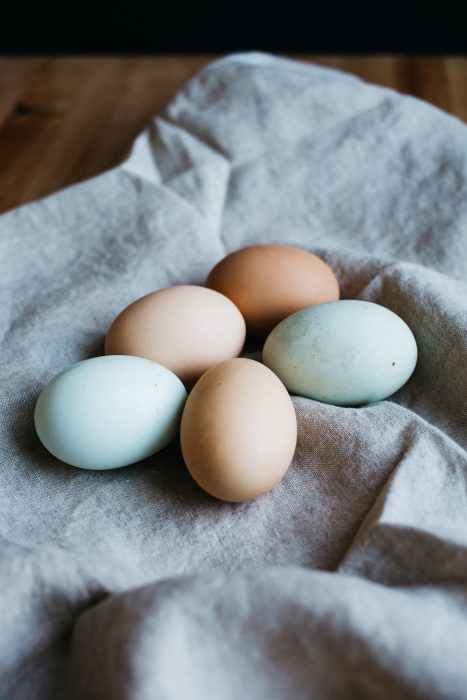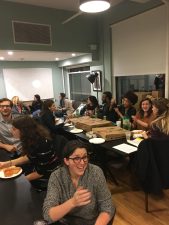Catapult Alumni
Minor Moves
Micah slips out of Grigor’s apartment in the middle of the night. The air is cool and damp. The world is quiet and still except for a few cars in the street, and a few lights on in the building behind him. The walk to his building isn’t long, and he’s feeling rested and well […]
Micah slips out of Grigor’s apartment in the middle of the night. The air is cool and damp. The world is quiet and still except for a few cars in the street, and a few lights on in the building behind him. The walk to his building isn’t long, and he’s feeling rested and well for the first time in a long time; he is also energized thinking about what the future holds, the impossibility of it, of leaping into space and staying there forever. It’s strange to think of it now because he probably would have spent the rest of his life in this place, in this city, on this street. He would have spent the entirety of his life in these circumstances which to him are now charged with the energy of the impermanent, of the transient. But the prospect of leaving it all behind has rendered even the ugly white paint on the crumbling building across the street anew. He’s seeing it all as if for the first time. It’s the long, backward glance of the migrant, of the exile—he had watched the house in the country shrink and shrink until it had become nothing at all, nothing except the pale blue of its walls and the dark shingles of the roof.
On the street, he takes a cigarette and lights it. The taste is kind of skunky. It’s an old pack of Grigor’s that he’s taken up out of the kitchen drawer. He had convinced Grigor to quit not so long ago. Waste of money, waste of lungs, and Grigor had dropped the pack into the drawer with a look of determination and sadness. Okay, he had said then. Let’s give it a try. Not knowing that what Grigor had been referring to had not been the smoking at all, but the thing between them which at the time had been new and tentative and halting. Easy to begin, Grigor said. Hard to stop.
Micah sucks down some of the smoke and feels immediately like a cliché. He crouches down next to the stoop and worries his hair. He flicks at the end of his nose. His eyes are stinging from the smoke. He bites his knuckle. If he stays out here any longer, the damp and the cold are going to get to him, and it’ll be hard to get up in the morning. The last thing he needs is to get sick. His body, after all, is the only thing he has to speak for him. It’s the only reason they selected him. He knows that Grigor is right about this, but whereas Grigor thinks that this should deter him, Micah sees only an opportunity. Or, not only an opportunity, but more of a chance than he’s been given his whole life to do something of his own will. He’s been given a chance to irrevocably alter the shape of his life and his mother’s life, to better things for the two of them. And how many people get to do that, really? How many people get to decide where and how their lives will take them?
He rolls his shoulders. There’s a knot back there, and some irritating heat from the press of Grigor’s beard. He feels marked all over, his body a strange cartography of desire and regret and fear. He should get going. Get going. His thighs are burning. He’s chewing on the end of his thumb. He pushes up. Pushes on. A car coasts by, and he is momentarily blinded, and then illuminated in the glow of its headlights, and then, as quickly as all that, he’s cast back down into shadow.
***
His mother is in the kitchen when he gets home. She is peering into her laptop in the dark. There is a faint hum in the apartment, which he cannot immediately place but which he recognizes eventually is the sound of the fridge. There is electricity coursing through the wires and cables of the apartment again. She must have paid the light bill somehow, even without his effort, which stings him. He sits across from her, and her eyes slowly glide up to his face. She smiles.
“Hey, baby,” she says. “How are you? It’s late.”
“Fine,” he says, unable to keep the surliness out of his face. She frowns at him. Why is everyone always frowning at him today?
“I got the lights,” she says. “You don’t have to shower in the dark anymore. I know you hate it.”
“Alright.”
In the dark, it’s hard to see her eyes narrow, but he can feel it just the same. The subtle increase in pressure being directed his way. The gathering heat of her temper. She has had a long day. She has had a hard day. Full of scratching and scraping and bearing the brunt of her life as it blows in on her from every direction, a day spent dealing with the world and all its strange wildness. She has brought electricity into their home again, paid down the fines and the bill and made promises by smiling with her teeth that they’d keep it on this time. She reaches over and snaps the light on, seems to weave it out of the very air in front him. He flinches in its brilliance, recalls the car on the street, which had momentarily bathed him in its light. He wants to return to the dark. But it’s too late. The light carries the intention of her anger, its weight, its scathing heat.
“What is your problem, Micah? What is wrong with you?”
“I didn’t do anything,” he whines. “I didn’t do anything.”
“Then what’s ailing you? What’s the matter?” She is not angry—at least, she is not all anger. There is tenderness, love. She is beautiful. Tall, lean, full of angles and beautiful lines. Skin so dark it gleams in the light like a piece of polished stone. But she is not stone, flesh and blood, alive and warm, and her almond-shaped eyes peer out at him as if from across some impassable void. Mothers are always unknowable in some way to their sons. “What’s wrong?”
How to say that he’s wounded because he couldn’t help with the lights, with anything, that he’s just a burden. How to say, his love feels like a sinking stone.
“I don’t know,” he says. “I’m fine. It’s fine. Long day. I’m sorry.”
“It’s okay,” she says. “Me too. Hey, I made some dinner. Do you want some?”
“I could eat,” he laughs.
“I know,” is her answer as she smiles and rises from the table. He takes her laptop and turns it around to him. She has been looking at scans of old pictures from the old house. He is looking at younger version of himself, a smiling little brown boy with hair going in every direction. He’s holding her hand, and she’s gripping the top of a straw hat. There’s a bright smile on her face too.
“Who took this,” he asks. “Where is the original?”
She is at the stove, heating up some peas and neckbones. She squints to see the picture. “Oh, probably your daddy. Frank sent it to me.”
Micah freezes. She says it so casually, calling up his father, who has been out of their lives for so long that Micah only thinks of him sometimes, stumbling across memories of him the way you might trip over a stick or a rock in the woods. His father has sunk so far into the past that Micah can only barely remember his face and the shape of his anger, which was violent and persistent, like storms in the summer. For this reason, he has always been reluctant to bring up his father to his mother, but here she is, surprising him yet again.
“I didn’t know he took pictures,” Micah says.
“You don’t have to do anything but point and click. It’s not magic.”
“I know, I know. I just. I don’t know, strange to think about him that way.”
“What way, baby?” She’s stirring the peas, bringing them to a boil. He can smell them, and his stomach growls.
“With us, I guess. I can’t imagine him with us,” Micah says. His mother’s face turns a little sad at that, and she wets her lips, looks away.
“Time is funny like that,” she says eventually. “You get so used to stuff that it’s hard to remember how it used to be, how people used to be, how you used to be.”
“Yeah.”
“I imagine you can get used to anything, get used to missing anybody, and eventually you just sort of stop.”
“Why is that?” Micah asks. “Why do you just stop, if you love somebody, why do you stop missing them or loving them?”
“Maybe you don’t. Maybe you just get so used to missing them that it’s a part of you then, just becomes part of your day, your life, like brushing your teeth.” She sets the plate in front of him. The black-eyed peas, the neckbones, the dark meat, bits of okra here or there. She has given him a slice of cornbread too, and he lets it soak up the juice.
She sits across from him and takes the laptop back, smiles at the picture of the two of them, as if the joy she takes from it is uncomplicated and easy.
“Do you miss him?” Micah asks. He takes a bite of the food, and it’s warm and good and so perfect that he wants to sink down into it. Like home.
“Your daddy? No, not really. He was a mean man. But sometimes, I think I miss the person I wanted him to be.”
“Who was that?”
“Don’t talk with your mouth full—well, your daddy was so handsome, so smart, so funny. And, I just, wanted him to be those things. But he was something else, too. Something I couldn’t fix. And he couldn’t fix. Because he didn’t want to.”
“What?” Micah asks. “What didn’t he want to fix?”
“It was so long ago,” his mother says, still looking at the picture of them at the old house. “Do you remember those chickens we had?”
Micah shakes his head.
“We had three hens and your daddy always called them Shadrach, Meshach and Abednego.” She pauses to shake her head at the memory. “Anyway, they were just like puppies. They followed him everywhere. They would just settle up next to his feet when he was sitting on the porch. They’d follow him into the woods to hunt. They even tried to swim with him.”
“That can’t be true.”
“Oh it is. And they weren’t even nice chickens. They were mean. They’d shit all over the clothes on the line. They’d lay eggs everywhere but their nests. They would just beeline for me every time he wasn’t around. And he thought it was so funny.”
“I bet.”
“Well, one day, I get tired of it. I have had it with these chickens. They have eaten all my greens. They’ve plucked all my beans. They have to go. And I go to your daddy out back. I march up to him. And I’m bout to just let him have it. But I stop.”
At this moment, his mother is not looking at the laptop but looking directly at Micah, though not Micah at the table, Micah as he was then, a small little thing, crawling everywhere, whining and crying and laughing at nothing in the air. She’s looking at a version of him, a version which exists in the story she’s telling because she’s slipped back into the past.
“I stop because he’s holding Abenedgo. And that chicken hated me from the moment it hatched, but your daddy is holding that chicken, sobbing like a baby. And he’s sobbing because the chicken is dead in his arms. And I say, What happened. And your daddy turns to me and says, I don’t know, Charlotte. I don’t know. I came out and she was gone. She’s gone.”
“What?” Micah asks.
“Yeah, I guess somebody had been walking by and the chicken attacked them, so they grabbed her up and broke her neck. And left her there in the road. And your daddy was upset, so upset that he went and got his gun down from the wall and he was just pacing the front yard. And I’m saying, hey, calm down, hey it’s okay, it’s just a chicken. And what did I say that for, because he stops and looks at me. I mean, really looks at me.”
His mother leans back in the chair and takes a deep breath, lets in, lets it out.
“He points the gun at me. And he asks me so seriously: Did you kill my chicken? And I say, no. No I didn’t, but I wish I had. Bang.” Micah’s blood freezes, but he knows that nothing could have happened to her in that moment, yet the story has driven him to reach back through his memory for anything at all that might suggest something else, a truth tucked behind the history of it all.
“What?” he shouts. “What? He did what?”
“Yeah, he just, pulled the trigger. But it didn’t hit me. He was aiming at something over my shoulder, but I could see it in his eyes, he hated me. He hated me and he would have killed me if he could, but he couldn’t…well. Anyway. There was something in him that he couldn’t shake.”
Micah does not know what to think or what to do in this moment with this information. His mother has closed her eyes, is breathing in and out very slowly, building up her calm, her resolve, her peace. The hum of the fridge seems louder now, and he can now hear the sound of electricity in all of the other appliances too, a soft wool of background noise that he lets himself sink into.
“I don’t remember that,” he says. “I always think about that house as like, heaven, like home. I didn’t know this.”
“You were a baby,” his mother says, smiling. “What do babies know?”
***
Micah is lying on his back in the dark. His mother is asleep. He’s thinking about the pictures. He’s thinking about where the originals must be. He’s thinking about the chickens, which he does not remember at all. The gun, a shot he must have heard when he was a little boy, the sound of it echoing out of the past, more made-up than real because he knows that such memories are impossible.
“Fuck,” he says. Anger is hot and acidic in the back of his throat. The last time he saw his father was ten or more years ago, a few years after they lost the house and had to move into the city. His father had been living in the city for years by that point, already had a second family, a white family, two boys. He wanted Micah to get to know them, but standing next to them, he felt hulking and rough. Besides, they were babies, five and six, and he was twice their age. What did he know about babies.
His father had sat across from him in a café while his brothers David and Charlie stood sheepishly behind him, peering at the strange, dark boy, full of sullen anger, glaring at them. His father was living with a man named Frank. How two men made two boys, Micah did not know.
He’s dead now. Long gone. His brothers as remote as two dull stars.
Micah does not miss him. The memories do not coalesce into something that could be called loss. It’s difficult not miss someone you do not know. But his mother might be onto something. Maybe it’s not his father he misses, but what he feels he missed out on by having such a terrible man for a father in the first place. Perhaps what he misses is not the person, but the idea, the possibility. He rolls over on the couch and pulls the blanket up over his shoulders.
He has a text from Grigor:
you bail? why?
had to see my mom.
she ok?
fine
ok. when are you leaving?
idk who knows
don’t leave without saying goodbye again
u miss me? cute
just don’t
Micah lets the conversation go. The blueish glow of the phone is hurting his eyes. He doesn’t need another tether keeping him to Earth, especially now that he’s made up his mind to go, to leave. He doesn’t need it. Another message from Grigor:
hey i’m sorry about it. i’m sorry i was so chickenshit before. i’m sorry about it.
He doesn’t respond to this either. There’s an ache in his chest, and he feels hollow through and through. He pushes his thumb up against his eyes and counts down from ten, letting the space between each number grow until he can barely remember what number he’s on. There’s something like grit under his eyelids. What a time, he thinks, to get so many fucking attachments. What a time for love, for kindness, for the personal revelation, to be feeling so sorry for himself.
What will it be like up on Mars, he wonders. Spinning on a cold red rock in space, stuck inside of suits, inside of machines to keep him alive. What will it be like up there, no sugar, no coffee, nothing except carefully portioned nutrients, a life so finely partitioned as to leave no mystery at all.
On Earth, you can pretend that you do not know how your life will go. You can pretend that you aren’t living inside of a system inside of a system. You can pretend that there is mystery, elasticity to your circumstances. It is possible to surprise yourself because on Earth, there are other people, and there is always the chance that they will do something shocking, like fall in love with you when you tell them that you’re leaving the planet. Or, they will point a gun at you because their favorite chicken has died. Or they will, suddenly, cease being the angry, hateful person you know them to be and raise two quiet boys in a small suburb with a man named Frank.
There is a randomness to it all, or, the appearance of randomness. But up there, he imagines that the order of things will be so transparent, the system not yet hidden, as to become a telescope through which the end of his life is clearly discernable. It’s like going to pick out a burial plot. You know how it will end, how it all will go. The rest is just minor moves.
Micah turns onto his back and puts his arm across his eyes. Tomorrow, he will tell his mother the lie about the mission trip. He’ll tell her about going to South America to help with the floods. And then, the first check will arrive. And then the second. And then the third. And he will be training, preparing for the next life which will issue out of the first like a slender cloud of steam. And when he has prepared all that he can, mastered every skill that he can, they will hurl him into the sky.
It’s not so bad, he thinks. He doesn’t mind knowing the answer. He doesn’t mind the certainty of the outcome. In fact, he is comforted by the regularity, soothed to imagine the flow of money as a continuous unbroken stream, filling up his mother’s bank account until it becomes a lush, green future.







